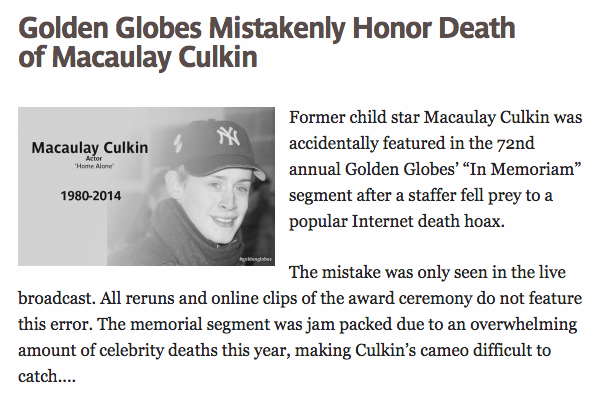Engaging with the Nature of Truth

A hoax, according to Facebook, is “a form of News Feed spam.” This can include, but is not limited to “scams (‘Click here to win a lifetime supply of coffee’), or deliberately false or misleading news stories (‘Man sees dinosaur on hike in Utah’).” The problem with these “hoaxes” is not their lack of truth, per se, but that the people who post them sometimes “later decide to delete their original posts,” especially if their friends later comment that their post is a hoax — this makes them “two times more likely to delete these types of posts.” Engagement deleted is engagement wasted; this is the truly terrible thing about hoaxes.
What is a not-hoax then — that is, truth? Truth is that which will be shared and not deleted. Because truth lies in the engagement of the user, Facebook will not remove “stories people report as false” or “review content and mak[e] a determination on its accuracy.” Instead, when users report a story in their Newsfeed as false — or if a story has been deleted enough by its original posters — it will get “reduced distribution in News Feed.” Deletion or injunction against false stories is not possible; Facebook is not an arbiter of truth, and besides, some users might still want to share it.
There is profound truth — extreme engagement — to be found, after all, in some fake news, like “satirical content intended to be humorous” — or better still for Facebook’s News Feed algorithms, “content that is clearly labeled as satire,” like so, even if it is not at all humorous or even intended to be, like The Daily Currant, the web’s largest deeply unfunny purveyor of fake news designed to trick people into sharing it, which, humorously enough I suppose, calls itself a “satirical newspaper.” This content, Facebook promises, “should not be affected by this update,” which is to say, as long as people engage with it.
In the eye of the engager, truth is an asymptote that continuously approaches but never quite crosses the line that would make it an outright lie. Asking whether or not it is strictly true that this dog is “protecting” a soldier while he sleeps is beside the point — which is nine hundred thousand likes and whatever it makes you feel. And that is the truest truth of all: Emotions are always real and identities are immutable. They cannot be falsified, only engaged with.
